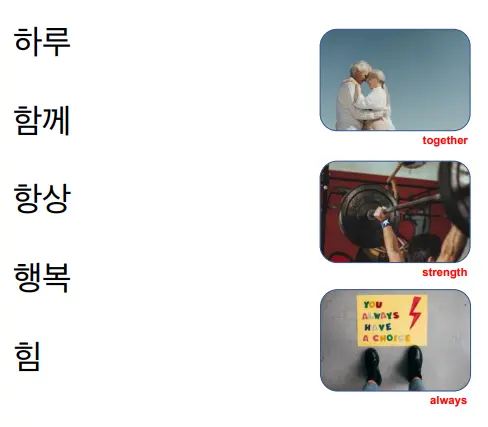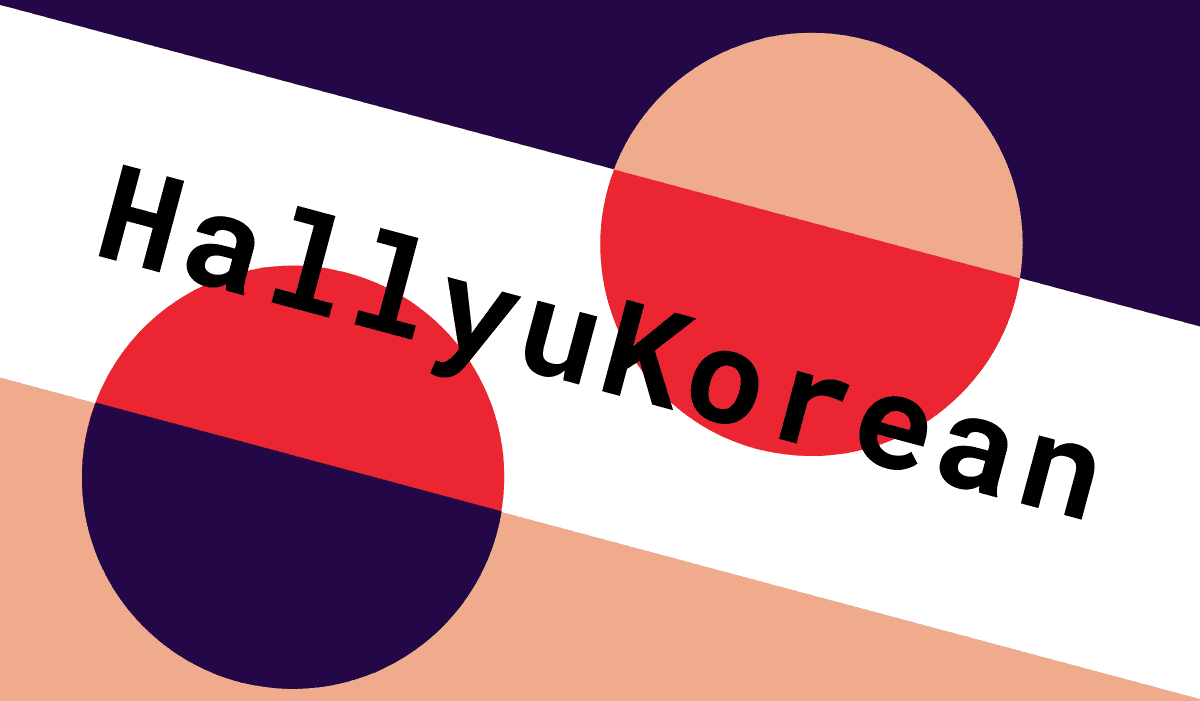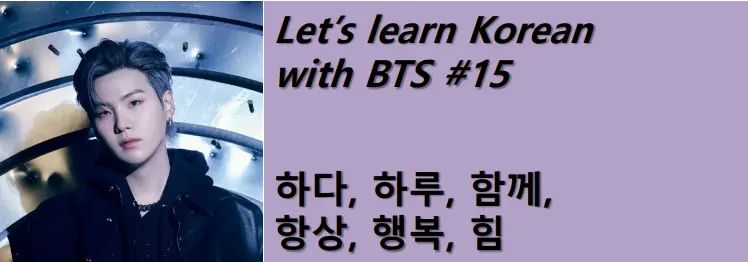Basic Korean words beginning with the consonant ㅎ([hi-eut], [h] sound)
Let’s learn Korean words 하다, 하루, 함께, 항상, 행복, 힘 with BTS lyrics.
Click on the image below to listen to all the BTS lyrics used in this post.
하다 [ha-da] to do

ⒷⓉⓈ 이제 어떻게 해야 해
i-je eo-tteot-ke hae-ya hae
What should I do now?
*이제(now) +
어떻게(how) +
해야 해(하다(do) + ~아/어야 해(must))
(*~아/어야 하다 at the end of a clause to indicate that you ‘must’ do something.)
하루 [ha-ru] day, one day

ⒷⓉⓈ 내게 하루만 시간이 있다면
nae-ge ha-ru-man si-ga-ni i-tta-myeon
If I had only one day
*내게(나(I) + 에게(to), =내게) +
하루(one day) + 만(just, only) +
시간(time) + 이(subject particle) +
있다면(있다(to be, to have) + ~면(if))
함께 [ham-kke] together

ⒷⓉⓈ 같이 걸어볼까? 함께 걸어볼까?
ga-chi geo-reo-bol-kka ham-kke geo-reo-bol-kka
Wanna walk together? Wanna walk together?
*같이(together) +
걸어볼까?(걸어보다(walk)+~ㄹ까(shall we)) +
함께(together) +
걸어볼까?(걸어보다(walk)+~ㄹ까(shall we))
항상 [hang-sang] always

ⒷⓉⓈ 나 항상 니 모습만 떠올라
na hang-sang ni mo-seup-man tteo-ol-la
I only think of you always
*나(I) +
항상(always) +
니(너(you)+의(of) = 네 = 니) +
모습(appearance) + 만(only) +
떠올라(come to mind)
행복 [haeng-bok] happiness

ⒷⓉⓈ 난 이 순간 행복해
nan i sun-gan haeng-bok-kae
I’m happy in this moment
*난(나(I) + 는(topic particle)) +
이(this) +
순간(moment) +
행복해(행복(happiness) + 하다(to be, to do))
(*이 means ‘this (near you)’, 그 means ‘the / that (near the other person)’ and 저 means ‘that (over there)’.
‘이, 그, 저’ are always followed by a noun and are used to refer to things or people.
To use 이, 그, and 저 as pronouns, 거/것 (thing) needs to be added after these words.)
힘 [him] strength, power

ⒷⓉⓈ 너의 힘이 돼줄래
neo-ui hi-mi dwae-jul-lae
I’ll be your strength
*너(you) + 의(of) +
힘(strength) + 이(subject particle) +
돼줄래(will be, = 되어줄래)
Grammar Reference
*Verb stem + 을까/ ㄹ까 : an expression used to ask for the listener’s opinion or propose something.
을까 for verb stem which end with a consonant, ㄹ까 for verb stem which end with a vowel.
을까요, ㄹ까요 is more polite expression than 을까, ㄹ까.
ex)걸어볼까? (걸어보(다)(walk) + ~ㄹ까(shall we), shall we walk?)
*Noun + ~에게 : to
ex)내게 : 나(I) + 에게(to)
*Noun + ~만 : only
ex)하루만 : 하루(one day) + 만(just, only)
모습만 : 모습(appearance) + 만(only)
*Noun + ~이/가 : noun + subject particle
ex)시간이 : 시간(time) + 이(subject particle)
힘이 : 힘(strength) + 이(subject particle)
이 for noun which end with a consonant, 가 for noun which end with a vowel.
*Noun + 하다 : verb
Many Korean nouns that indicate or describe an action or behavior can be combined with 하다 to form verbs.
In some cases, nouns can be turned into verbs by simply adding the verb 하다(to do, to be).
ex)행복(happiness) + 하다(to be, to do) = 행복하다(to be happy)
*Noun + ~의 : of
ex)너의 : 너(you) + 의(of)
니 : 너(you) + 의(of) = 너의 = 네 = 니
Quiz. Linking words to images

BTS music video to enjoy
Well done for making it this far.
Watch the IDOL music video above and see if you can hear “난 이 순간 행복해”, which you learned today.



